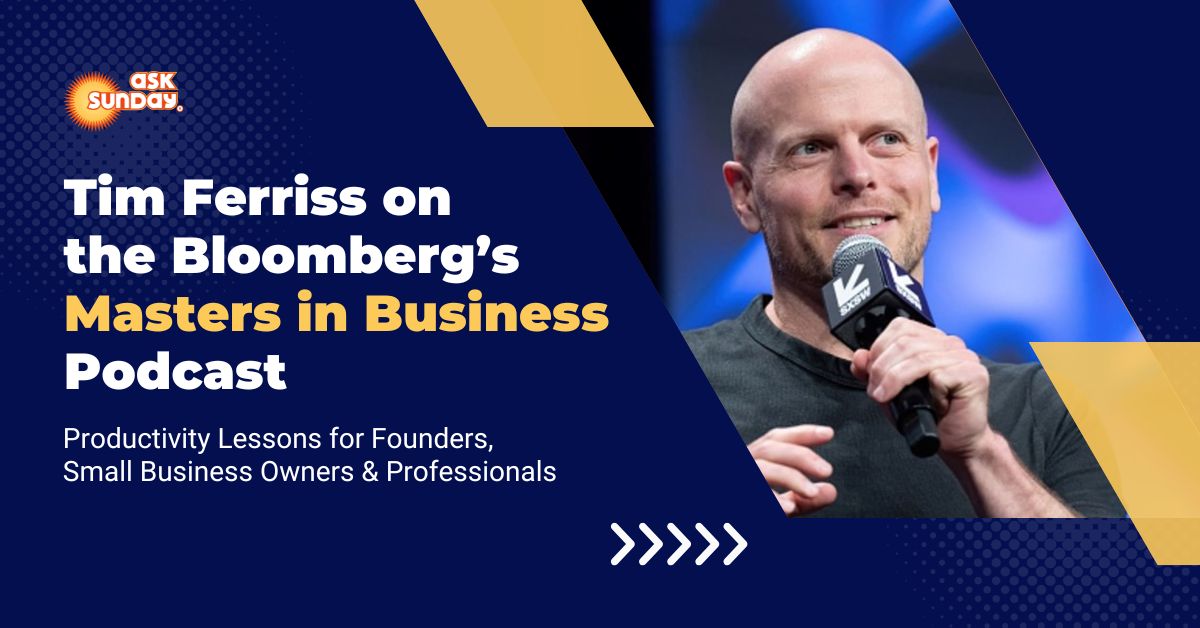
Tim Ferriss on the Bloomberg Masters in Business Podcast: Productivity Lessons for Founders, Small Business Owners & Professionals
Written by: Amrit Kumar
Tim Ferriss — bestselling author of The 4-Hour Workweek — recently appeared on Barry Ritholtz’s Bloomberg Masters in Business podcast. The episode, titled “The Productivity Mindset”, is quickly becoming a reference point for entrepreneurs and professionals who want to work smarter, not just harder.
In this blog, we’ll unpack the biggest takeaways from the Tim Ferriss podcast interview, translate them into practical steps for different industries, and highlight why this conversation is one of the most valuable productivity podcasts you can listen to right now.
Whether you’re a startup founder, solopreneur, coach, doctor, or real estate professional, these lessons can help you build clarity, reclaim time, and scale without burning out.
Why Listen to the Bloomberg Masters in Business Podcast with Tim Ferriss?
The Bloomberg Masters in Business podcast hosted by Barry Ritholtz is known for in-depth conversations with thought leaders in finance, entrepreneurship, and innovation. Having Tim Ferriss as a guest was a major highlight because Ferriss blends productivity science with real-world experiments from working with top performers across industries.
This particular Bloomberg podcast episode goes beyond hacks. It emphasizes mindset shifts — from fear-setting to systems thinking — that can transform how leaders approach both work and life.
Key Lessons From the Tim Ferriss Podcast on Productivity
Here are the central ideas from the Tim Ferriss podcast interview on Bloomberg Masters in Business, along with tailored applications for different professionals:
1. Focus on High-Leverage Activities
Ferriss stresses the Pareto principle: 20% of activities drive 80% of outcomes.
- For startup founders: Focus on fundraising, product-market fit, and key partnerships rather than micromanaging admin work.
- For solopreneurs: Spend mornings creating revenue-generating products or services before tackling small tasks.
- For real estate agents: Concentrate on prospecting and client relationships rather than paperwork.
How to act on this: Make a weekly “leverage list” — the top 3 activities that create real growth. Everything else should be delegated, automated, or eliminated.
2. Fear-Setting vs Goal-Setting
Instead of only writing goals, Ferriss practices “fear-setting”: defining the worst-case scenario if you take a bold step. This reduces anxiety and clears decision-making.
- For small business owners: Fear-setting helps with choices like expanding to new markets or launching a new product.
- For coaches: Clarify fears around raising prices or targeting a higher-value niche.
- For doctors: Assess risks like financial loss vs long-term independence.
How to act on this: Create a three-column sheet: (1) Worst-case scenario, (2) Steps to prevent it, (3) Steps to recover if it happens.
3. Protect Your Morning Routine
Ferriss notes that the first 60 minutes of the day should create clarity, not chaos.
- For founders: Block mornings for deep work (product development, strategy).
- For solopreneurs: Use mornings for content creation, marketing, or sales.
- For doctors and coaches: Spend mornings preparing mentally before sessions.
How to act on this: Try a morning ritual: no email, no social media. Instead, journal, plan your day, or move your body.
4. Balance Output With Recovery
Ferriss emphasizes that sleep, fitness, and downtime are not optional — they are fuel for productivity.
- For executives: Protecting downtime prevents poor decision-making.
- For real estate professionals: Schedule rest between high-energy client calls and showings.
- For solopreneurs: Avoid the “always on” trap by taking evenings or weekends completely offline.
How to act on this: Schedule rest just like meetings. Use wearables or apps to track sleep and recovery.
5. Journal to Improve Decisions
Journaling is one of Ferriss’s key productivity tools. Writing helps identify patterns, offload mental clutter, and clarify fears.
- For coaches: Journaling can reveal client trends and refine methods.
- For founders: Reviewing entries helps track what’s really moving the business forward.
- For doctors or small business owners: Journals can help manage stress and decision overload.
How to act on this: Try a daily 5-minute journal. Ask: “What’s one thing I must do today to feel accomplished?” Review weekly for insights.
6. Lean Into Discomfort and Curiosity
Ferriss explains that growth often lies where fear or discomfort exists. Curiosity compounds into breakthroughs.
- For solopreneurs: Experiment with new platforms or offers.
- For real estate agents: Push past hesitation to adopt video marketing or AI tools.
- For founders: Test bold ideas on a small scale before scaling up.
How to act on this: Each week, choose one small discomfort — public speaking, trying a new marketing channel, or having a tough client conversation.
Why This Matters Across Industries
Here’s how these lessons directly apply to different audiences:
- Startup founders: Build scalable systems early; delegate non-core tasks.
- Small business owners: Use fear-setting and high-leverage focus to reduce overwhelm.
- Solopreneurs: Protect mornings and avoid burnout by balancing output with recovery.
- Coaches: Journal for clarity, lean into discomfort when pricing or niching.
- Doctors: Balance patient care with personal well-being to avoid burnout.
- Real estate agents: Double down on relationships while delegating admin.
7-Day Productivity Reset Inspired by Tim Ferriss
| Day | Focus | Application |
|---|---|---|
| 1 | Identify high-leverage activities | Founders list top 3 growth levers |
| 2 | Do a fear-setting exercise | Small business owners assess expansion risks |
| 3 | Morning ritual | Solopreneurs block 1 hour for deep work |
| 4 | Recovery | Real estate agents schedule rest between showings |
| 5 | Journal | Coaches or doctors note patterns in daily practice |
| 6 | Discomfort challenge | Try one uncomfortable but growth-oriented task |
| 7 | Weekly review | Check what worked, what to repeat |
How This Tim Ferriss Podcast Stands Out
Unlike typical self-help shows, the Bloomberg Masters in Business podcast is structured, detailed, and industry-relevant. This Tim Ferriss episode blends timeless wisdom with practical execution tips. It’s not just a productivity podcast — it’s a blueprint for designing a sustainable business and personal life.
Conclusion
The Tim Ferriss interview on the Bloomberg podcast is a must-listen for anyone serious about productivity, clarity, and long-term growth. Whether you’re a startup founder, solopreneur, small business owner, coach, doctor, or real estate professional, the lessons are immediately actionable.
Apply one habit this week — whether it’s fear-setting, journaling, or protecting your morning routine — and you’ll notice clarity, focus, and momentum compound over time.
Tim Ferriss puts it best: “The key isn’t doing more. It’s doing the right things, more clearly.”










